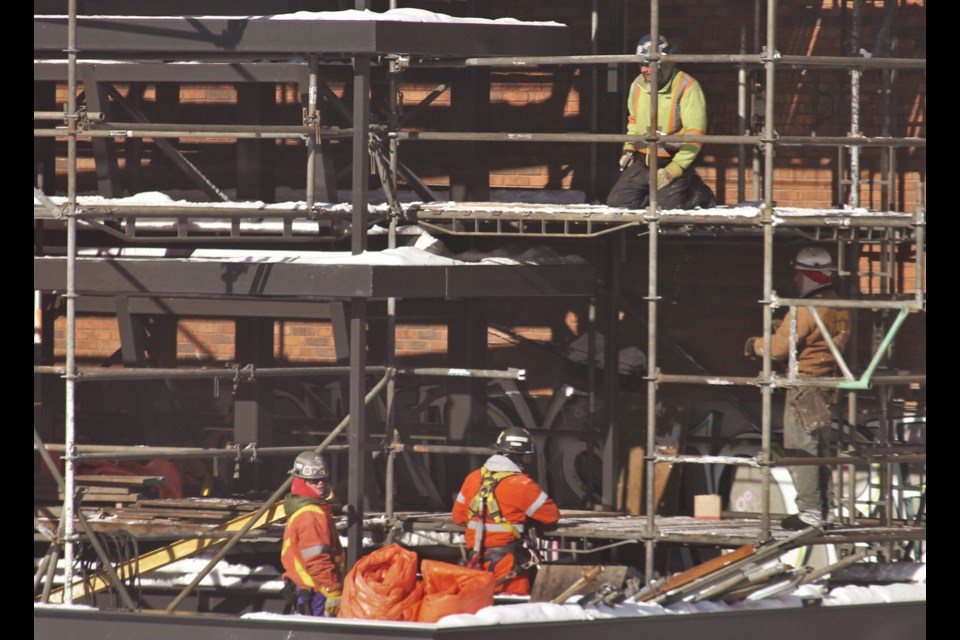Building officials are critical for communities and more are needed immediately if the province hopes to maintain health and safety standards..
That is the call being put out by the Ontario Building Officials Association (OBOA) as the profession faces a mass of retirements and a shortage of applications to fill those positions.
“The silver tsunami is going to hit us in about two years, when 50 per cent of building officials in the province become eligible to retire by 2020,” said Tina Finelli, an OBOA marketing associate during a presentation at College Boreal Jan. 30. “Building officials are critical. They do everything from inspecting buildings for safety and code compliance, draw up and approve budgets, and help shape policies for health and environment standards in construction.”
Fellow marketing associate Sherri Gallowitz related some statistics. The province contains more than 444 municipalities, all of them need building officials. In 2017, construction spending totalled $38.5 billion in Ontario, with 100,000 housing starts for that year.
No construction happens without building officials, she said. Building officials are vital to public safety, overseeing the planning, budgeting and construction and by-law enforcement for everything from residential, commercial, to institutional and have jobs in rural, urban and suburban settings.
The wide variety of jobs means people can often find a job near their current home, Gallowitz said.
To drive the point home about the benefits of building officials, several professionals joined in a panel discussion on their experiences. They included Guido Mazza, chief building official for the City of Greater Sudbury, Victoria LaChapelle, plans examiner for the City of Sudbury, Brock Sanftenberg, building inspector for the City of Sudbury, Francois Couture, coordinator of Plans Examinations and By-Law Enforcement Officer for the City of Sault Ste. Marie, Dennis Castellan, architect, principal partner at 3rdLine Studio and associate professor at Laurentian University's McEwen School of Architecture and Sherri Budgell, manager of plans examination for the City of Sudbury.
All of them agreed it was a rewarding career, with competitive pay and pretty much a guaranteed job.
“I am in a career where I know I will retire, with a pension, and not have to worry about job loss. We are in high demand and always will be,” Couture said.
Demand is so high that institutions, municipalities and unions are collaborating to attract more applicants, as well as making it easier for those interested to start their qualification process. Local colleges like Boreal and Cambrian College already offer construction and trade programs, along with McEwen's architecture degree programs. All of those qualify under the OBOA standards.
George Brown College in Toronto runs the official building code certification programs for the province. Many of those can be done online.
Most building official jobs require some kind of architecture and engineering training, but hands-on experience in construction, and even retail, are also considered valuable.
Finelli said being a building official means working side-by-side with everyone from construction workers, to city administration, people applying for permits, engineers and architects.
“There is a broad range of skills in this occupation. That is what we are trying to get across,” she said.
The OBOA has many resources for applicants and students to access, including course material to help them get certified and network to find jobs.
It's not just schooling that is required. Finelli said people have to have interpersonal skills, a desire to learn, good communication skills and client focus.
Being a building official also means being at the forefront of new technology. Gallowitz spoke about the Mackenzie Vaughan Hospital, outside Toronto, currently being built. The building will be one of the first “smart” buildings in the province, incorporating health and safety, environmental innovation and new architectural techniques to make it a more efficient building. While being built, she said there is a truck on-site solely for building officials to work as the building progresses.
Some of the perks of the job, according to the panellists, is it's never the same thing every day. Budgell said they are constantly helping people through a process and making decisions on major projects.
For others like Couture, it is about working together for the greater good of safer buildings and thriving communities. He said they will not always get along or see eye-to-eye, but in the end, it is about the best solution according to laws, design, time constraints and safety standards.
Mazza added that building officials work for municipalities, but are there to ensure provincial and local building codes are followed.
He related an argument he had with a citizen that claimed he paid his salary because he's a taxpayer to show the independence officials have.
“I asked him if he had ever applied for a building permit, and he said no. So I said you have never paid my salary because I am paid through fees for permits,” he said.




